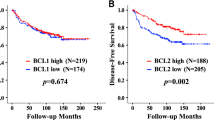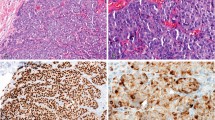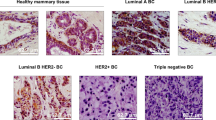Abstract
Expression of the bcl-2 gene was investigated in 218 human breast carcinomas by immunohistochemical analysis. Immunodetections were assessed using (1) frozen sections, (2) documented commercially available monoclonal antibody (bcl-2/124, Dako), (3) automation of immunoperoxidase technique (Ventana) and (4) quantitative evaluation of results by image analysis (SAMBA) and statistical analysis of quantitative data (BMDP software). Bcl-2 protein expression was correlated with current prognostic indicators and with molecular markers detected by the same procedure as for Bcl-2. It was shown that Bcl-2 expression is not related to patients' age, tumour size and type or lymph node status, but an inverse relationship was observed between Bcl-2 and tumour grade (P < 0.0001). An inverse relationship was also observed between Bcl-2 expression and p53 (P < 0.0001), Ki67/MIB1 antigen- (P = 0.0012), and P-gp- (P = 0.002) positive immunoreactions. In contrast, anti-Bcl-2 positive reaction was significantly associated with ER-positive (P < 0.001) and with ER/PR-positive or ER/PR/pS2-positive immunoreactions (P < or = 0.005). Bcl-2 expression was independent of CD31 and cathepsin D expression. Thus, Bcl-2 protein, thought to be antiapoptotic, exhibits parodoxical expression in human breast carcinomas. It is strongly detected in low-grade tumours (well-differentiated) with low (MIB1) growth fraction, but is independent of the tumour progression (size, node status, CD31, and cathepsin D). Bcl-2 acting on apoptosis is related to p53 gene abnormalities in breast carcinomas. Bcl-2 protein expression may also be involved in response to endocrine therapy (associated to ER/PR/pS2 positive immunoreactions) and probably with chemoresistance mechanisms (inverse relationship with P-gp).
This is a preview of subscription content, access via your institution
Access options
Subscribe to this journal
Receive 24 print issues and online access
$259.00 per year
only $10.79 per issue
Buy this article
- Purchase on Springer Link
- Instant access to full article PDF
Prices may be subject to local taxes which are calculated during checkout
Similar content being viewed by others
Author information
Authors and Affiliations
Rights and permissions
About this article
Cite this article
Charpin, C., Garcia, S., Bouvier, C. et al. Automated and quantitative immunocytochemical assays of Bcl-2 protein in breast carcinomas. Br J Cancer 76, 340–346 (1997). https://doi.org/10.1038/bjc.1997.388
Issue Date:
DOI: https://doi.org/10.1038/bjc.1997.388
This article is cited by
-
Expression patterns and prognostic value of Bag-1 and Bcl-2 in breast cancer
Breast Cancer Research (2008)
-
Telomerase activity, estrogen receptors (α, β), Bcl-2 expression in human breast cancer and treatment response
BMC Cancer (2006)



